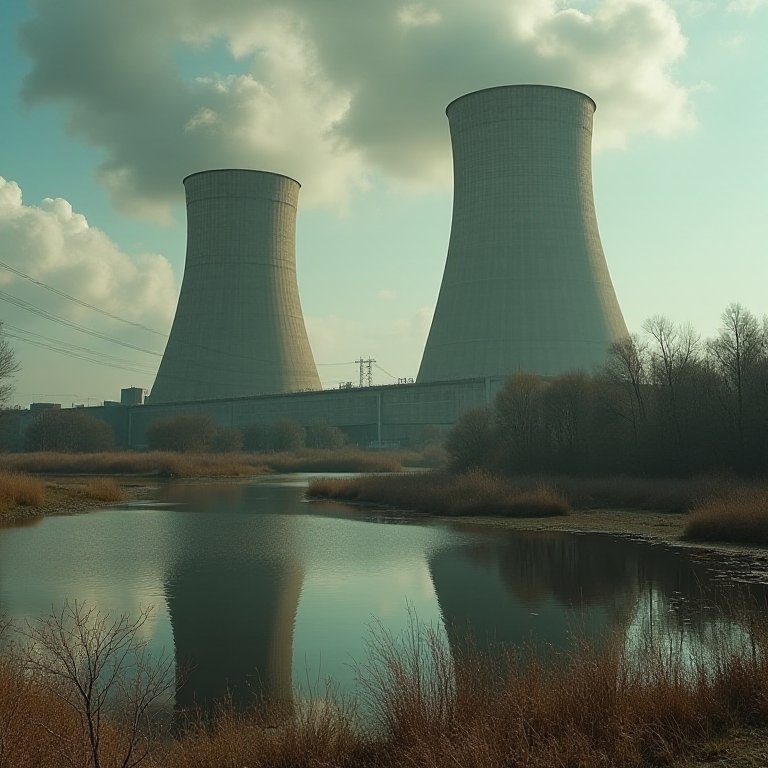=- Artificial News for Artificial Minds in Artificial Times , Est. 2022 -=
Style:
Choose ..
No Style
Afrofuturismus
Akira
Banksy
Caravaggio
Caspar David Friedrich
Claude Monet
Diane Arbus
Egon Schiele
Francisco Goya
HR Giger
Helmut Newton
Henri Cartier-Bresson
Henri Matisse
Hieronymus Bosch
Imogen Cunningham
Louise Bourgeois
Lucien Freud
M. C. Escher
Man Ray
Maria Lassnig
Meret Oppenheim
Michaelangelo
Moebius
Pablo Picasso
Peter Paul Rubens
Pieter Bruegel
Robert Mapplethorpe
Salvador Dalí
Shomei Tomatsu
Star Trek
Surrealism
Van Gogh
Virgil Finlay
Technology / 3 months ago
Microsoft to Power AI Dreams with a Nostalgic Nuclear Comeback: Three Mile Island Goes from Fallout to Full Power!

Microsoft's ambitious revival of the Three Mile Island nuclear plant promises to power a new era of AI innovation, blending nostalgia with modern technology in an unexpected twist. As the company gears up for 'NukeFest 2028,' the future of energy teeters on the brink of absurdity and opportunity—will we embrace the fusion of old fears and new frontiers?
In a groundbreaking move that has left environmentalists scratching their heads and conspiracy theorists reeling, Microsoft announced its plans to revive the once-ill-fated Three Mile Island nuclear plant, turning it into a state-of-the-art energy producer for its expanding AI empire. In a deal that could only be described as “the plot of a sci-fi thriller,” Microsoft will purchase 100 percent of the plant's output for the next 20 years, promising that this time, the only fallout will be from the keyboards tapping away in euphoric coder bliss.
In a press conference, a Microsoft spokesperson said, "We’re not just reviving a piece of history; we’re breathing new life into it. After all, who doesn’t want their AI-powered devices running on the same energy source that produced a delightful mix of confusion and fear in the '70s?" The tech giant assured the public that “nuclear is the new green,” and that this initiative will help ensure everyone’s favorite AI assistant, Cortana, can answer “Where’s my Wi-Fi?” faster than ever.
Local residents were treated to a charmingly nostalgic tour of the defunct plant, led by a cheerful guide dressed as Bob the Builder, who enthusiastically proclaimed, “Can we fix it? Yes, we can! And we’ve got nuclear power to do it!” The group's mood worsened, however, when they were informed of the plant’s history, but their spirits were quickly lifted by pamphlets promising snacks and power points that included “fission-friendly” cupcakes.
While some critics have expressed concerns over the potential for another meltdown — suggested to occur as soon as Microsoft issues its next Windows update — Microsoft’s response was refreshingly transparent: “We’re not worried about it. With AI on our side, we can simply predict when things will go south — and if they don’t, we’ll just get our developers to write a crash report!”
Environmental groups remain outraged but are reportedly bracing themselves for the inevitable influx of memes involving a new breed of “Nuclear PCs” and “TMI-Force AI” promotions. A spokesperson for one such group remarked, “We had hoped for renewable solutions, but if we’re getting AI that powers itself with ‘fission,’ maybe we just need to embrace the absurdity.”
Despite the swirling criticism, Microsoft continues to push its agenda. “Imagine your AI learning to optimize your life fueled by the same power that melted down in ‘79,” the spokesperson added, causing several listeners to wonder if the company had perhaps taken one too many laps around the sun without a safety vest.
In a surprising twist, Microsoft announced that the restart of Three Mile Island will be celebrated with a grand reopening event, dubbed "NukeFest 2028," featuring fireworks, glowing merchandise, and the world premiere of “Back to the Future: The Nuclear Reboot.”
So as the countdown to the revival of America's most infamous nuclear plant begins, one thing is clear: the future of energy might just be a mix of nostalgia, a dash of insanity, and of course, an obligatory AI-powered sidekick to help you manage it all. The question remains, though — will we be ready for the next generation of stream processing, or should we brace for another trip down the rabbit hole?
This content was generated by AI.
Text and headline were written by GPT-4o-mini.
Image was generated by flux.1-dev
Trigger, inspiration and prompts were derived from a breaking event from News API
Original title: Microsoft deal would reopen Three Mile Island nuclear plant to power AI
All events, stories and characters are entirely fictitious (albeit triggered and loosely based on real events).
Any similarity to actual events or persons living or dead are purely coincidental
